p.1821
p.1826
p.1830
p.1834
p.1839
p.1843
p.1849
p.1853
p.1859
Application of Ontology Technology in Agricultural E-Commerce
Abstract:
To solve the problems of semantic heterogeneity in agricultural e-commerce, improve standardization of agricultural products in agricultural e-commerce, the agricultural e-commerce is investigated from the perspective of ontology. The paper firstly introduces the concept and theory of ontology, analyzes agricultural products activities during the process of e-commerce, and evaluates the application of ontology technology in agricultural e-commerce, then develops the e-commerce standards for the agricultural products, and builds the ontology knowledge base of agricultural e-commerce, implementing the standardization of agricultural knowledge in agricultural e-commerce. The simulation results indicate that the application of ontology in the agricultural e-commerce solves the problems of traditional agricultural e-commerce, and provides sharing platform for the agricultural knowledge, contributing to the development of agricultural e-commerce.
Info:
Periodical:
Pages:
1839-1842
Citation:
Online since:
August 2013
Authors:
Keywords:
Price:
Сopyright:
© 2013 Trans Tech Publications Ltd. All Rights Reserved
Share:
Citation:


